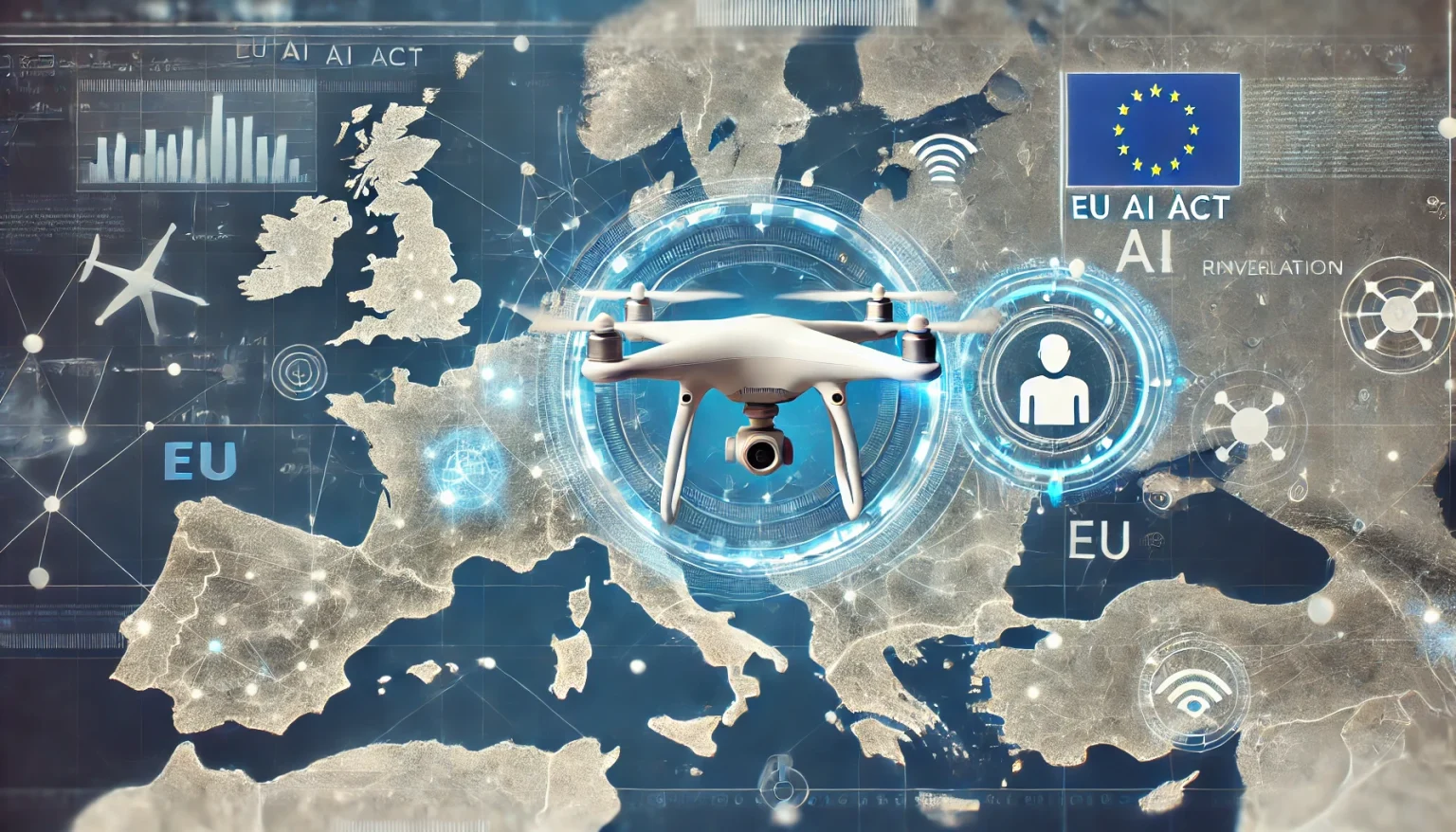The integration of Artificial Intelligence (AI) into drones has revolutionised various industries, from agriculture and logistics to surveillance and defence. AI-powered drones offer advanced capabilities like autonomous navigation, obstacle avoidance, and sophisticated data analysis. However, the rapid advancement of AI technologies brings forth legal and ethical challenges that necessitate robust regulatory frameworks.
The European Union’s proposed Artificial Intelligence Act (AI Act) represents a pioneering effort to regulate AI technologies comprehensively. As a drone lawyer based in the UK, I aim to explore the potential impact of the AI Act on the drone industry and review the current state of its implementation across various EU countries.
The EU AI Act and Its Relevance to Drones
The AI Act is designed to mitigate risks associated with AI systems by categorizing them based on their potential impact on safety and fundamental rights. High-risk AI systems—those used in critical infrastructure, law enforcement, or that have significant implications for health and safety—are subject to stringent regulatory requirements.
Key Implications for the Drone Industry:
1. Classification as High-Risk AI Systems: Drones equipped with AI functionalities for surveillance, data collection, or autonomous operations may be classified as high-risk. This classification subjects them to rigorous compliance obligations.
2. Compliance Requirements: Manufacturers and operators must implement risk management systems, ensure high-quality data sets, maintain transparency, and provide detailed technical documentation.
3. Conformity Assessments: Before entering the EU market, AI-powered drones may need to undergo conformity assessments to verify compliance with the AI Act’s provisions.
4. Transparency and Human Oversight: The Act emphasises the need for human oversight over AI systems. Drone operators may be required to ensure that AI decisions can be audited and overridden by humans when necessary.
5. Data Governance: Strict rules on data quality and governance affect how drones collect, process, and store data, especially personal or sensitive information.
Current Implementation Status in EU Countries
While the AI Act is still under negotiation and has not been enacted as of October 2023, several EU Member States are proactively preparing for its implementation.
Spain
Spain has established the Spanish Artificial Intelligence Supervisory Agency (AESIA), demonstrating a proactive stance toward AI regulation. AESIA is set to act as the market surveillance authority under the Department of Digital Transformation, indicating Spain’s commitment to enforcing the AI Act’s provisions once they become law.
Finland
Finland proposes a decentralized model by appointing multiple existing authorities as market surveillance entities, including the Energy Authority and the Medicines Agency. This approach leverages existing regulatory bodies to oversee AI compliance across different sectors.
Italy
Italy is considering assigning its national digital and cybersecurity agencies to enforce the AI Act. Preparations include building internal capacities and fostering research partnerships, emphasizing the development of competencies and continuous dialogue with scientific communities.
Ireland
Ireland has published a list of nine national public authorities responsible for protecting fundamental rights under the AI Act. These authorities will gain additional powers to address high-risk AI systems, including access to mandatory documentation from developers and deployers.
Germany and France
Both countries are actively engaged in discussions and preparatory measures to align with the AI Act. Germany’s Federal Ministry for Economic Affairs and Climate Action and France’s Directorate General of Enterprises are leading these efforts, though detailed implementation plans are still forthcoming.
Implications for the UK Drone Industry
Although the UK has left the EU, the AI Act could significantly impact UK-based drone companies:
– Market Access: To operate within the EU, UK companies must ensure their AI-enabled drones comply with the AI Act’s requirements.
– Regulatory Alignment: The UK may consider aligning its AI regulations with the EU to facilitate trade and maintain high standards of AI governance.
– Competitive Edge: Understanding and adapting to the AI Act can provide UK companies with a competitive advantage in the European market.
Recommendations for Drone Stakeholders
1. Stay Informed: Keep abreast of developments regarding the AI Act and its implementation across EU Member States.
2. Assess AI Systems: Evaluate existing AI functionalities within drones to determine if they fall under the high-risk category.
3. Prepare for Compliance: Develop strategies to meet compliance obligations, including documentation, risk assessments, and implementing human oversight mechanisms.
4. Engage with Regulators: Participate in consultations and dialogues with regulatory bodies to influence policy and gain clarity on compliance requirements.
Conclusion
The EU AI Act represents a significant step toward comprehensive AI regulation, with profound implications for the drone industry. Companies involved in the development and operation of AI-powered drones must proactively address potential compliance challenges. By understanding the regulatory landscape and preparing accordingly, drone manufacturers and operators can ensure continued innovation while adhering to legal and ethical standards.
—
About the Author
Richard Ryan is a drone lawyer based in the UK, specialising in aviation law, AI regulation, and data protection. With extensive experience advising drone manufacturers, operators, and users, Richard Ryan has presented to leading defence companies on the impact of AI regulation on drone technology. Committed to guiding clients through the complex legal landscape of emerging technologies, Richard Ryan offers insights and expertise to navigate the evolving world of AI and drones. Richard Ryan is a PhD student at Cranfield University researching the regulatory framework of UTM system for unmanned aviation.
Related
Discover more from sUAS News
Subscribe to get the latest posts sent to your email.


